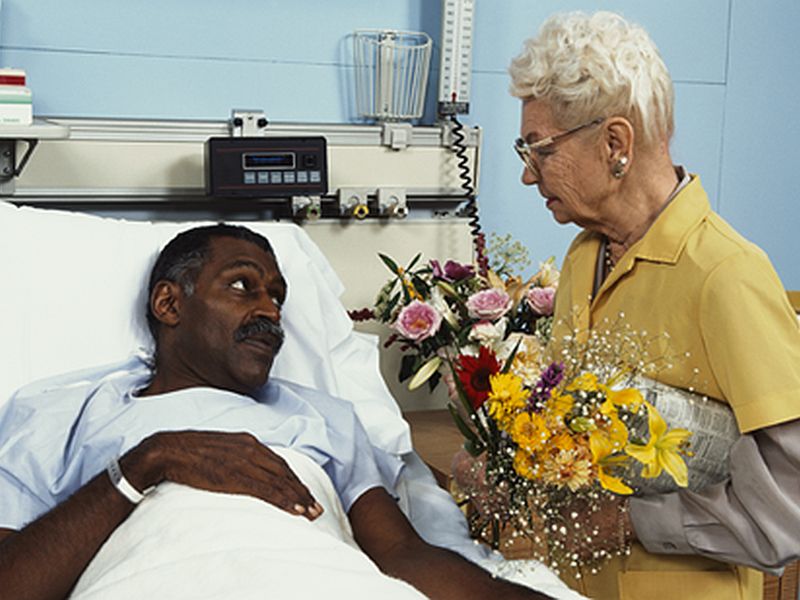

Head Position May Not Affect Outcome After Stroke
International study suggests patients will do as well sitting up as following doctor's orders to lie on their backsWednesday, June 21, 2017

WEDNESDAY, June 21, 2017 (HealthDay News) -- New research might turn conventional stroke treatment on its head.
An international study suggests doctors need not ask patients to lie on their backs, eyes trained on the ceiling, for the first 24 hours of their recovery -- a popular way to prevent complications. It appears patients do just as well if their heads are elevated, the study found.
"Head positioning does not seem potent enough to produce changes in the brain that make a difference to the chances of survival and recovery from acute stroke in patients," said lead author Dr. Craig Anderson, head of a global health institute at Peking University Health Science Center in China.
"They [head positions] also are not the key factor related to the harms associated with impaired swallowing and breathing disturbance after acute stroke," he added.
Doctors have long believed blood flow to the brain is better and swelling is reduced when patients lie on their backs in bed, with the head elevated 30 degrees, Anderson said. But, he added, "the optimal head position to produce the best outcome from acute stroke, and avoid potential risks, such as aspiration pneumonia, is essentially unknown."
Still, many U.S. and European stroke centers have strict policies for patients with acute ischemic stroke, ones caused by blocked blood flow to the brain.
They require patients to lie on their backs for up to 72 hours and limit trips to the toilet, often prompting complaints, Anderson said. "In much of the developing world, where most of the stroke burden exists, most patients are positioned lying flat as they do not have modern mechanical or automatic hospital beds that allow the head [to be] elevated," he said.
To shed more light on the issue, Anderson's team randomly assigned hospitals in nine countries to treat just over 11,000 patients with acute stroke in one of two ways for the first 24 hours. Those in one group were told to lie on their backs, while the other was allowed to sit up with head elevated at least 30 degrees.
After 90 days, researchers found no significant differences in death rates and disability between the two groups. Nor was there any significant difference in the rate of complications like pneumonia.
The findings could be good news for stroke patients.
Those in the study reported that lying on their backs was less comfortable and led to more back discomfort, Anderson said. They were also more likely to leave the study, possibly because they were uncomfortable, he said.
A U.S. neurologist said the new research provides useful information, since patients may feel better when they aren't lying on their back.
But Dr. Bruce Ovbiagele, chairman of neurology at Medical University of South Carolina, said the findings don't address all of doctors' concerns about bed positioning, because most of the patients studied had suffered milder strokes.
Patients who have more severe strokes are at special risk of developing pneumonia, and it's vital to put them in positions that improve blood flow, he said. The study doesn't offer clear answers about positioning for them, he said, meaning that many physicians won't do anything different.
Lead author Anderson said stroke patients should feel free to use whatever position they prefer. He added that nurses should position them "in a way that provides best care" and avoids problems with eating, getting to the bathroom and moving around.
Ovbiagele said, however, that side sleeping is not a good idea for recovering stroke patients because it wouldn't improve blood flow and could make the airway vulnerable.
The study was published in the June 22 issue of The New England Journal of Medicine.
SOURCES: Craig Anderson, M.D., Ph.D., professor, neurology and epidemiology, University of New South Wales, Sydney, Australia, and executive director, The George Institute for Global Health at Peking University Health Science Center, Beijing, China; Bruce Ovbiagele, M.D., M.Sc., chairman and professor, neurology, Medical University of South Carolina, Charleston; June 22, 2017, The New England Journal of Medicine
HealthDay
Copyright (c) 2017 HealthDay. All rights reserved.
News stories are written and provided by HealthDay and do not reflect federal policy, the views of MedlinePlus, the National Library of Medicine, the National Institutes of Health, or the U.S. Department of Health and Human Services.
- More Health News on
- Stroke








































No hay comentarios:
Publicar un comentario